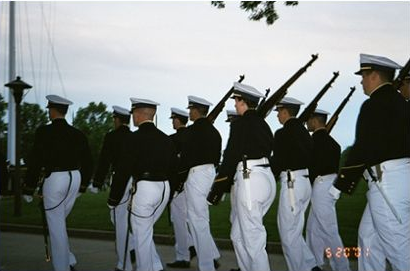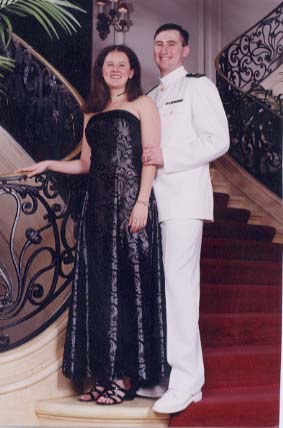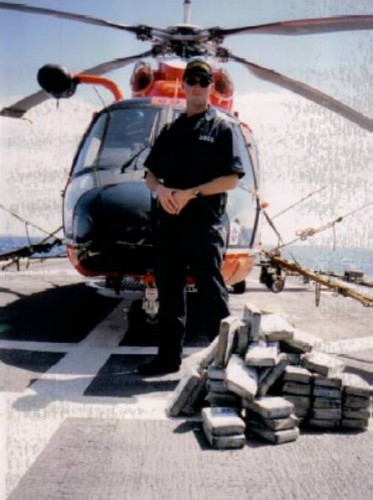Happy Veteran’s Day!
We just found out through the magic of Facebook that Veteran’s Day has just passed us by. Ah the magic of the internet, mothers and friends who still say thank you after all the years…thanks for that, by the way 😉
We’d hate for a day that is so important to both ourselves and so many of our friends to pass by unnoticed, and it just so happens we recently got a question on the blog from someone who is considering becoming a pre-veteran…. Look, she’s considering joining up ok? But it’s Veteran’s Day so we had to stretch it here. A little latitude if you please?
Brittany asks:
“I was hoping you could provide me with some advice…My fiancé and I are contemplating joining the Coast Guard together after we get married and while we know there are never any guarantees we want to put ourselves in the most likely situation to be able to stay together. I just graduated with my bachelors degree and he is very close to completing his. We are both at a cross roads, not really sure what to do next because we’ve been in school our whole lives. In addition, we are both the outdoorsy thrill seeking type so an office job really isn’t cutting it. I’ve been doing a lot of research on married military couples and have received completely mixed reviews; however what it seems to come down to is what you choose for your job and whether or not you become an officer. Both of us are very driven and I wouldn’t want us to have to sacrifice career advancement to stay together. Do have any suggestions as far as how to increase our chances of being able to stay together? Any particular jobs that offer more opportunities than others? How did you guys make it work?”
We got about halfway though the below article when we realized that we should probably just put the short answer up here:
If you both go in to the Coast Guard, most likely at some point you will have to choose between living with your spouse and your career because the Coast Guard just isn’t large enough to always have good career options for both of you in the same place.
Now here’s the long answer that leads up to that –
These are much easier questions to answer in person than in a blog because we can get into a conversation. There are also a lot of unasked questions here that we’ll have to bring up for no other purpose than to confine what it is we are and are not talking about.
You did not ask if only one of you would join.
You did not ask why you should join or not or why we did.
Nor did you directly ask what Tiffany and I are like and how we fit into the military mindset or if we were or were not “typical” officers (whatever that means. Greg was once told he had to have ‘it’ with a nine on his forehead…and something about trains but drinking more Gatorade never directly seemed to correlate to promotions).
One could also take into account the economy in America right now and how good a guaranteed paycheck might look to the brand new owners of two very impressive pieces of paper (congrats, by the way. Not a small thing you’ve accomplished) and likely a whole lot of debt.
You also asked a pair of officers vice enlisted, and not only that but Academy grads (something Greg remembers involved lots of push-ups and being a ‘hard nucleus’ of the officer corps…please don’t ask him what atomic physics has to do with a seagoing military force…) so that will affect our answer as well.
We were both ship drivers with secondary specialties vice land ops specialists or marine safety types.
You also, incidentally, asked Coasties vice Jarheads or Squiddies or Grunts or …darn it what was the Air Force one…”Zoomies” and the different services are all extremely varied in jobs, mission and even quality of life. What we are saying here is that we are biased…and so are you.
Right now our guess is that you have an image in your head of what it means to serve in the military and you are attempting to prove or disprove that image. That’s where we were when we were making the decision. We feel for you. There is a lot of BS out there about what it is to serve as a couple in the military, and recruiters don’t always help. We’ve met good ones and other ones that were trying to make their ‘sales quota’ for the quarter. (yeah, scary ‘cuz you’re a two for one deal.) If you want to connect with some good recruiters who will give it to you straight, ask. We’ll do our best to make that happen for you. Obviously, we love to help and we have the unique advantage of being pretty neutral about your decision. We’re out, so hey, it’s no skin off our back either way.
A little background on us so you know where we are coming from. Both of us entered the US Coast Guard Academy immediately after graduating high school…as in about a month later. We served 4 years there as cadets and graduated with bachelor’s degrees
(and yes peanut gallery, when subject to the UCMJ and forced to drill with a rifle, full of lead or not, it’s called ‘serving.’ Don’t care if it counts towards retirement or not we still slept in a barracks and spent our summers chipping paint off a 378’.) We each served 2 years aboard 210 foot patrol boats and 3 years on land stations before requesting and receiving permission to be honorably discharged and placed in the inactive reserve. As an officer you’re not allowed to quit without permission and as enlisted you can only have the option to quit about once every 4-5 years. You knew that right? And ALL terms of service (officer or enlisted) are at least 8 years no matter what. The active duty component is the part most people talk about, but remember back in the Iraq war when those retired helicopter pilots got called back? Yeah…
Last Question first: “How did you guys make it work?”
The simplified version of our life “together” during active duty as it were looked like this:
Dating –
Year 2000: Both at the Academy.
Greg – That basically sucked a lot.
Tiffany – Yep.
Greg – One or two highlights though:
Us at a military ball at the academy. Tiffany spent an hour just straightening her hair. It’s the last time she’s ever done it 😉
Year 2001: Greg on a 210’ patrol craft in FL. Tiffany at the Academy
The short of it is on a patrol craft you’re in & out in almost equal proportions. But unlike the Navy where you go out and stay out for 6 months then come back and more or less stay in (3 day shake downs cruises don’t count) for 6 months or so in the USCG you’re out for a month then in for a month then out again and again. Upside is that you connect with the real world and your life more often. Downside is that you’re never really there and you’re never really gone either. You’re around enough to need to pay for a cell phone and get involved in arguments about family decisions but you’re not around enough to be a reliable babysitter or churchgoer. You basically get the worst of both.
But you also get awesome pictures standing next to millions of dollars of impounded cocaine and really cool stories to tell your friends when you get home.
Year 2002: Greg on a 210’ patrol craft in Florida. Tiffany on a 210’ patrol craft in Oregon.
We saw each other a TOTAL of 30 days this year, and if Greg landed in Portland at 9PM that counted as one of those days.
Year 2003: Greg on land in San Francisco, CA. Tiffany on a 210’ patrol craft in OR.
Greg lived for a year with one of his fellow officers. 10 hour drives through the night on short notice to see Tiffany for one day in a month when her boat pulled into San Pedro were not unheard of…and Dan, Greg still thinks you were right – so worth it. 😉
Before Tiffany transferred duty stations, we got married in Vegas in order to increase (NOT guarantee) our chances of her getting stationed in San Francisco. That’s its own blog entry though….. Suffice to say we spent the majority of the first 3 or 4 months of our marriage with Tiffany underway and out of contact.
Greg – “Think about that for a second.” ;-(
Tiffany – “GREG!”
Moving on….Also, Greg REQUESTED San Francisco because it has a large CG population / jobs for the area = high chance of both getting it & also improving our chances that Tiffany could get stationed here too.
Marriage:
Year 2004: Tiffany moves to San Francisco, CA with Greg
Year 2005: Greg and Tiffany live together in San Francisco, CA.
Year 2006: Greg leaves active duty
Year 2007: Tiffany leaves active duty
As you would guess we spent a LOT of money in airfare. Between that and his business, Southwest still sends Greg birthday cards over 2 years after he left the country. We could also afford airfare because we were young officers who had no college loans.
We would both encourage you to go officer. Greg’s mom said it best, “they get paid more. A LOT more.”
We served on ships and bases as Ensigns making bank alongside Seamen living on food stamps because they were below the poverty line. We hate that that’s true. It sickens us how little junior enlisted are paid but that also, is another blog entry. For you, with college bills and a family and a wedding to pay for we’d suggest OCS (officer candidate school). That being said after about 5 years or so as an officer the “adventure” work is harder to get and you end up pushing a lot more paper. There are ways around that but they’re hard and will likely require you to go to sea more. Enlisted typically have more active work, though not always. In both cases it does in fact depend on specialty.
You should learn to love packing because you’ll move a LOT.
Once we became officers we literally never wanted for anything material. Plane tickets across the country? Sure. PS2 with video games? Why not? New bedroom set? Fine honey, whatever. At the end of our careers we were O-3s and between housing allowances, basic pay, etc. we had a joint family income of $10,000 a month at 26. (as O-1s it was closer to high $30Ks/year each but still at 21 that was good in 2001.) Granted we were in San Francisco which is one of the highest cost of living allowances in the US…and Greg was clinically depressed due to his constantly changing sleep schedule for his duties (literally flipped my clock from day to night about every week for 2 years straight. Call me a pansy if you want, but the shrink diagnosed me as depressed, and we’re being honest here) and our marriage was getting a royal battering when we were even awake at the same time but hey, $10K a month and no debt. That’s not chump change for a young couple with no kids. When we had the time, we lived very well. We should also mention the free unlimited healthcare, free unlimited dental, free unlimited gym membership, etc.
That’s “how,” and parts of it were great, but as you might guess it wasn’t working very well near the end for us. Which is why we left. That’s us though. You may not be like us, and many military couples serve entire careers happy as clams and having their needs taken care of just as they take care of the rest of us.
Second Question: Do have any suggestions as far as how to increase our chances of being able to stay together?
For the Coast Guard? First off, you must be married in order to be collocated. Not engaged, married, in a very real and legal sense. Second, really enjoy living in San Francisco, L.A., D.C. and Portsmouth VA. Maybe Kodiak AK, Tampa FL and New Orleans, LA depending on what you do. When we were in, these were the largest populations of personnel which meant the most potential job openings. Sooner or later though, assuming you’re both driven to succeed as you stated, there will only be so many senior people needed in any given area. Then you’ll have 3 options:
1) Live apart for a time like we did
2) At least one of you leave active duty (and possibly become a reservist?)
3) Both stay active but one of you hurt their career advancement by taking a less promotion-worthy job. As an aside, it is our understanding that in the enlisted world this happens much later in your career than in the officer corps. Also an enlisted person can remain the same rank for an extended period of time without consequences. As an officer you either get promoted on schedule with your peers or you get fired.
Any particular jobs that offer more opportunities than others?
Define an “opportunity.”
Opportunities to chase drug runners and terrorists? That’d be ashore OPS or serving on ships.
Opportunities to live a normal life together? Well, the Coast Guard went though a big restructuring since we left and back then you wanted to get into the marine inspection field if you wanted some semblance of a normal life. Our pilot friends seem pretty happy with their lot in life as well.
For us it was good for the short term (no college loans and plenty of pay not to mention full comprehensive health care and other benefits) and bad for the long term (diverging schedules causing separation and our careers were incompatible leading to strife. Also, work was bleeding into the home far too much).
We hope we overloaded you here. We hope we gave you way more to chew on than you can handle and you decide to re-read this article with your to-be husband, put a lot more thought into it and ask a lot more questions. Swearing an oath to serve anyone or anything for the next 5-8 years of your life should be done with caution and consideration.
And it is “serving” in case you had any illusions. You “volunteer” to sign that piece of paper but that’s where the free will part of it stops. After that you are a servant. From the highest ranking Admiral to the lowest Seaman, all of them are servants to the “needs of the service.” The “needs of the service” come first – above any personal needs that you may have to live with your spouse, spend time with your spouse, or make decisions with your spouse. Sometimes your personal needs and the Coast Guard’s needs don’t conflict. Sometimes they do. It is no small thing to willingly sacrifice your freedom to protect your fellow citizen. Ultimately that’s the hard part: you swear one oath to obey your country and another one to hold your spouse as more important than anything else except God …and then you have to make both work together. They don’t always and yet some people make it happen.
We have often found in our lives that when making choices it’s not the avoiding the wrong answers that is hard. It’s finding the answer that is the most right. You have a lot of options right now and many of them, including the military, are good ones with different advantages and disadvantages.
For us the right decision was to leave the Coast Guard. For some of our friends, it was to remain in the active duty military. What we would tell you to do is make a fully informed decision based on your personal needs and then do everything in your power to make that decision the right one.
The Coast Guard is stalking us, by the way. Want proof? Click on “How do you say “Landlubber” en Francais?”
About the authors
Greg and Tiffany are traveling around the world on sailing yachts and keep a video blog of their (mis)adventures. If sailing to Tahiti on a 44 ft sailboat, getting pooped on by seagulls, opening coconuts with dull machetes, sailing past tornadoes and ukulele Christmas carols are for you, then check them out at www.CoastGuardCouple.com!





